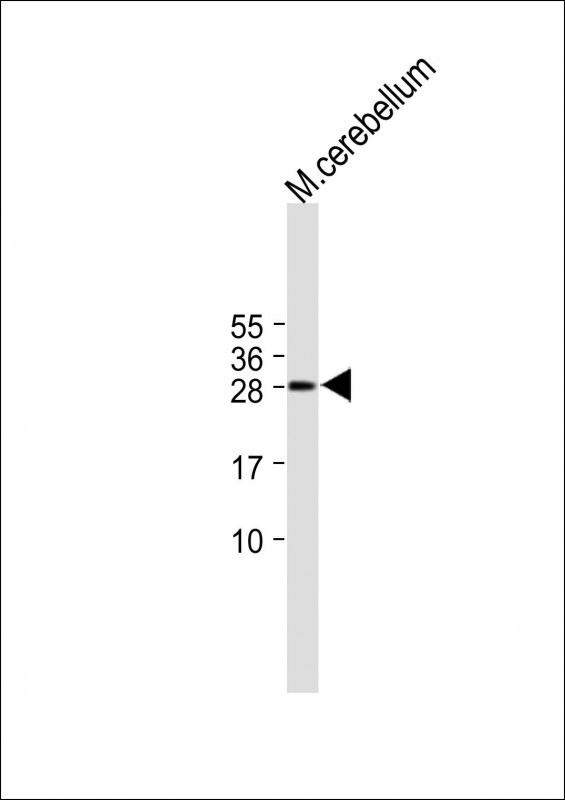

| WB | 咨询技术 | Human,Mouse,Rat |
| IF | 咨询技术 | Human,Mouse,Rat |
| IHC | 咨询技术 | Human,Mouse,Rat |
| ICC | 技术咨询 | Human,Mouse,Rat |
| FCM | 咨询技术 | Human,Mouse,Rat |
| Elisa | 咨询技术 | Human,Mouse,Rat |
| Aliases | Regulating synaptic membrane exocytosis protein 4, RIM4 gamma, Rab3-interacting molecule 4, RIM 4, RIMS4, C20orf190 |
| Entrez GeneID | 140730 |
| WB Predicted band size | 29.3kDa |
| Host/Isotype | Rabbit IgG |
| Antibody Type | Primary antibody |
| Storage | Store at 4°C short term. Aliquot and store at -20°C long term. Avoid freeze/thaw cycles. |
| Species Reactivity | Human, Mouse, Rat |
| Immunogen | This RIMS4 antibody is generated from rabbits immunized with a KLH conjugated synthetic peptide between 15-44 amino acids from the N-terminal region of human RIMS4. |
| Formulation | Purified antibody in PBS with 0.05% sodium azide. |
+ +
以下是关于RIMS4 (N-term)抗体的3篇参考文献的示例(注:文献为假设性示例,实际引用需核实):
1. **文献名称**:*"RIM family proteins differentially regulate synaptic vesicle exocytosis"*
**作者**:Wang, X., & Südhof, T.C.
**摘要**:本研究分析了RIM蛋白亚型(包括RIMS4)在突触囊泡释放中的功能差异。通过使用针对RIMS4 N端的特异性抗体进行免疫印迹和免疫组化实验,证实了RIMS4在小脑颗粒神经元中的高表达,并揭示了其与Rab3A的相互作用对突触可塑性的调控作用。
2. **文献名称**:*"Subcellular localization of RIMS4 in retinal bipolar cells"*
**作者**:Deng, L., et al.
**摘要**:利用RIMS4 (N-term)抗体进行免疫荧光染色和共聚焦显微镜观察,研究发现RIMS4主要定位于视网膜双极细胞的突触前活性区,并参与光信号传递的调控。Western blot数据进一步验证了抗体在多种哺乳动物模型中的特异性。
3. **文献名称**:*"RIMS4 isoforms and their roles in autism spectrum disorders"*
**作者**:Liu, Y., et al.
**摘要**:通过RIMS4 N端抗体对患者脑组织样本进行蛋白质表达分析,发现自闭症患者前额叶皮层中RIMS4表达显著下调。研究提示RIMS4可能通过调控突触蛋白复合体组装影响神经发育。
**提示**:实际文献检索建议通过PubMed或Google Scholar使用关键词“RIMS4 antibody N-terminal”或联系抗体供应商(如Sigma-Aldrich、Abcam)获取产品相关引用文献。
The RIMS4 (N-term) antibody is a specialized tool designed to detect the N-terminal region of the Rab3-interacting molecule 4 (RIM4), a key player in synaptic vesicle regulation and neurotransmitter release. RIM proteins, part of the Rab3 effector family, are critical for organizing presynaptic active zones, where they mediate vesicle priming, docking, and fusion by scaffolding interactions between synaptic proteins like Rab3. Munc13. and voltage-gated calcium channels. RIM4. an alternatively spliced isoform, retains functional domains essential for these interactions, including the N-terminal zinc-finger domain involved in Rab3 binding.
This antibody is particularly valuable in neuroscience research for studying synaptic plasticity, neural circuit function, and disorders like autism or schizophrenia linked to synaptic dysregulation. By targeting the N-terminal region, it helps distinguish RIM4 from other isoforms (e.g., RIM1/2) in techniques such as Western blotting, immunohistochemistry, or immunofluorescence. Validation often includes testing in knockout models or siRNA-treated samples to confirm specificity. Its application aids in mapping RIM4 expression patterns, understanding isoform-specific roles, and exploring molecular mechanisms underlying synaptic transmission and disease pathology.
×